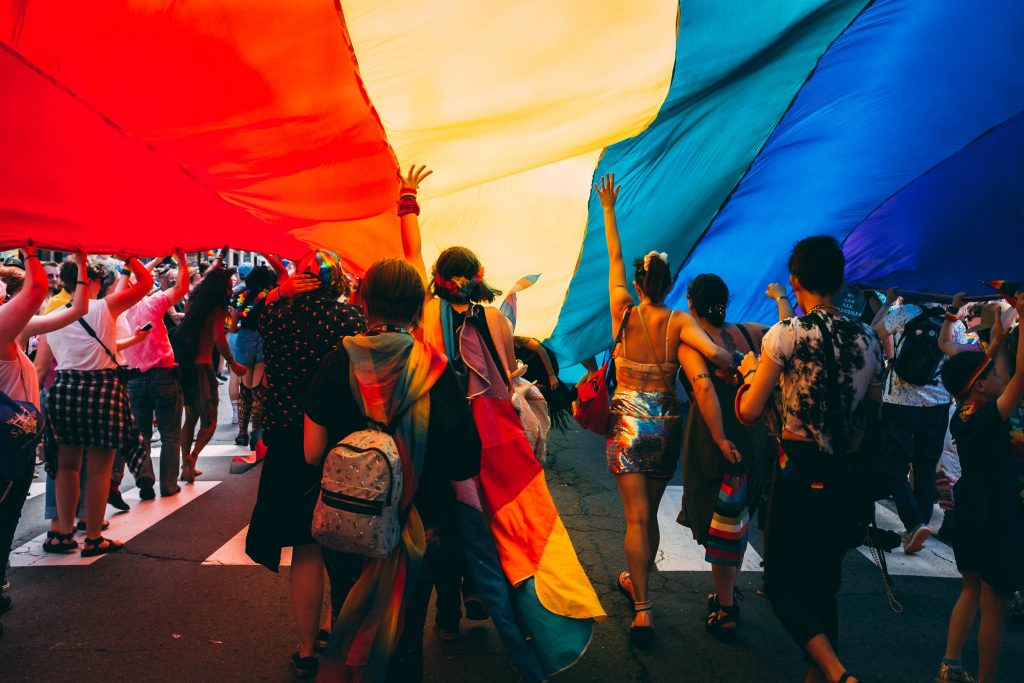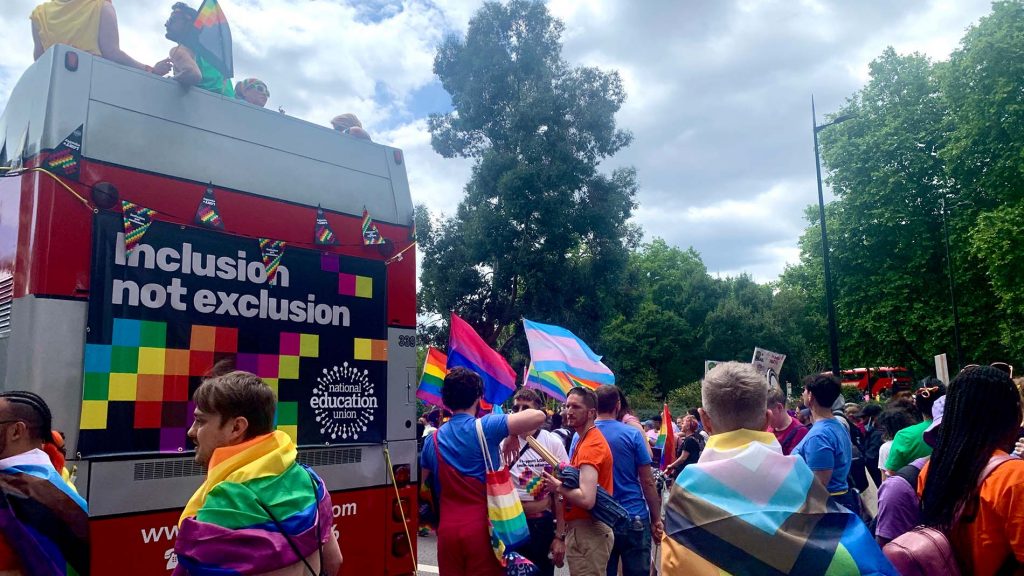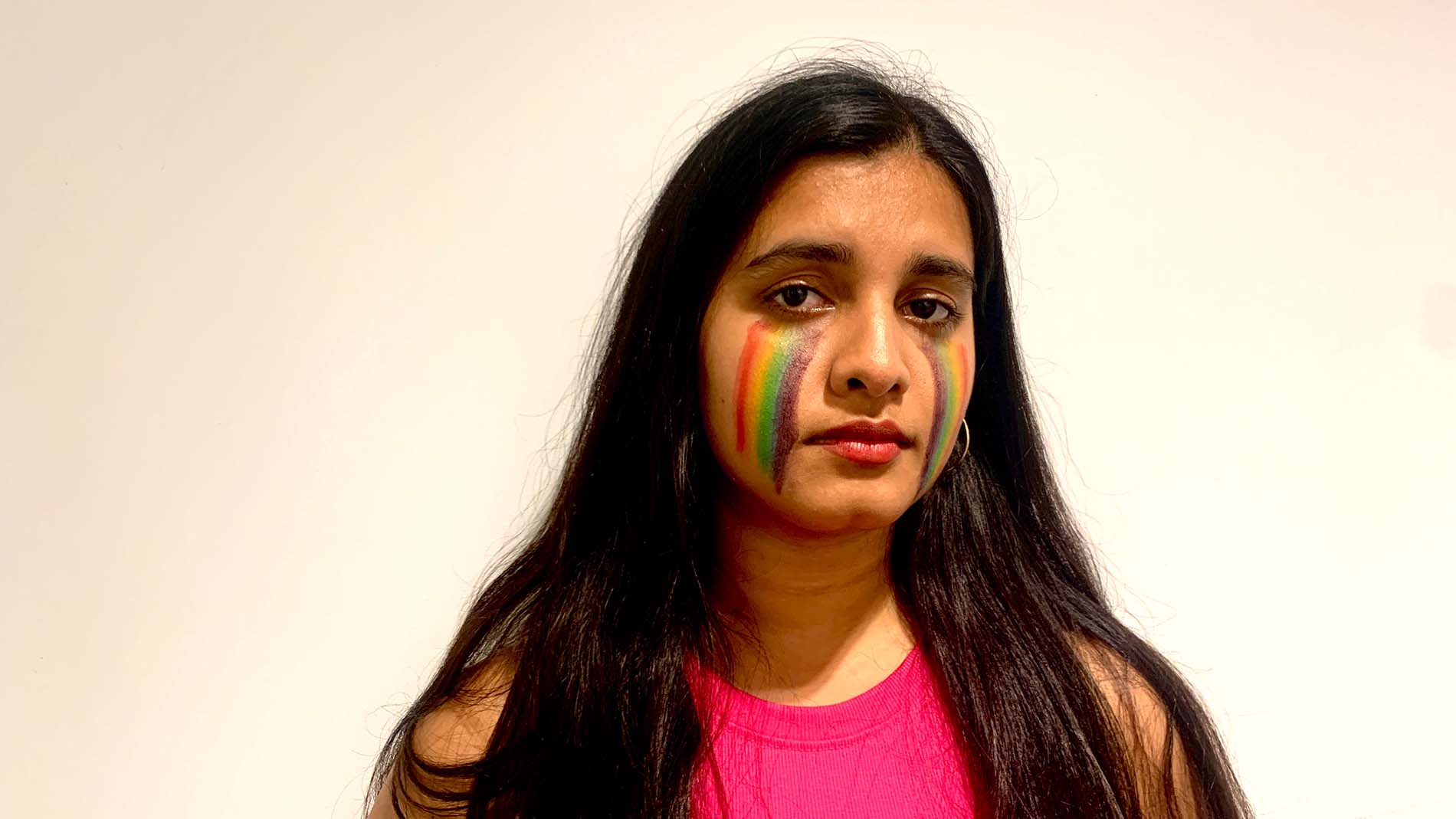Many queer asylum seekers face the threat of being sent back to countries where they will be persecuted for their sexual orientation and gender identity. How is the British government’s apathy affecting the lives of these people?
It was when the lorry came to an abrupt halt in the middle of the night that Salim* felt uneasy. He feared that he would be found. He had been in the cold, dingy trailer of the truck for two nights now, and the nauseating smell of petrol that filled the space, made him feel fuzzy.
When he got out of the truck, the effects of his dehydration came quick. People gathered around and called for help. But when the ambulance arrived, so did the police.
“My head was turning, and I was panicking… When I came out of the lorry, I passed out and people came to me. I told them I need help, but the police came. And when the police came, they locked my hands.”
Salim spent his first night in Britain in the confines of a prison cell. When his sickness worsened, he was taken to a hospital and then brought back to the prison where he spent four more days. Soon after he was released, he knew exactly what he needed to do- Apply for asylum. But this was far from easy.
He associated officials in uniforms with fear as it triggered past trauma. “It’s very hard. Nobody understands you,” he says. “I have a lot of anxiety. It has not been easy for me.”
For Salim, it took six years to arrive in the UK after he fled Afghanistan because as a gay man, he was under the risk of being persecuted. “They give a big punishment. If they find out… they will kill you. It’s very hard. People don’t care about you. You are all by yourself,” he says.
But it took the Home Office two months to send him a letter marked ‘Refuse’ across it.
Salim’s application being denied is not an isolated case. Many asylum seekers face rejections when they apply for sanctuary on the grounds of their sexual orientation.
It was reported that 78% of the applications were rejected largely due to the Home Office’s distrust in the claims of queer people seeking asylum.
Mo, a gay asylum seeker who fled the Middle East after facing discrimination for his sexual identity told The Independent, “The Home Office treat me like I’m a liar. I’ve told them my situation, but they don’t believe me… I don’t know how I can prove to them that my story is true.”
As 2000 people seek asylum on the grounds of sexual orientation and gender identity every year, the prime reason for their claims being rejected is that there is ‘insufficient proof’ of their identity.
The Home Office looks for photographs and letters that evidence that an asylum seeker was in a same-sex relationship in their home country. But they often disregard the fact that many of them had to flee overnight after being caught and that they were at the risk of being persecuted.
In an article by City University of London, Abeo, a Nigerian refugee stated that his interviewer at the Home Office did not believe his claim because he did not ‘look gay’.
It was noted that the Home Office often expects gay asylum seekers to appear ‘flamboyant’ and ‘effeminate’ and lesbian asylum seekers to be ‘butch’, to fit western queer stereotypes, and when they don’t, their claims are often deemed incredible, according to a study in the journal Ethnic and Racial Studies.
As a result of these expectations, Maiba, a Zimbabwean asylum seeker told Stonewall that when her case was dealt with in court, they questioned her sexual identity because she was not involved in any LGBTQ+ groups and events.
Most queer asylum seekers did not have the luxury of attending LGBTQ+ events, let alone visit support groups in their home countries because of anti-LGBTQ+ laws in place.

According to Moira Dustin, researcher of the Sexual Orientation and Gender Identity Claims of Asylum (SOGICA) Project, people who do not conform to western stereotypes of what being out and gay looks like, were judged to live ‘discreetly’ in their home countries, until in 2010, laws prohibited this. Yet, even now, queer asylum seekers are having their claims turned down.
Katrin*, who comes from Zambia, a country that has never had a pride march, had her claim rejected because there was no ‘evidence’ to state that she is a lesbian. Having concealed her identity all her life, she says, “There was so much fear. I was always hiding. I didn’t feel comfortable to open up because I just did not have the confidence.”
Like Katrin, many queer women have been told that they aren’t ‘queer enough’. Vani, a trans woman was told by her interviewer that she didn’t ‘look transgender’ and Maiba was told by the officer that they were ‘expecting a woman’ when they saw her.
Moreover, bisexual asylum seekers reported that their claims were considered unconvincing because they are attracted to more than one gender. Mukasa, a Ugandan refugee told Stonewall that although he had relationships with men, having married a woman, was disadvantageous for his claim.
I was very emotional, and I couldn’t stop crying and she didn’t even ask ‘Do you need any help’. She was just sitting there. She was just watching me.
Omar, a queer refugee reports to Stonewall about his asylum interview
Some queer asylum seekers were compelled into a heterosexual marriage so as to avoid the risk of their identity being found out. Forced to marry a woman, Abeiku*, a gay refugee in Cardiff, also struggled to prove his sexuality because the Home Office couldn’t understand why he was married to a woman, overlooking the fact that he was coerced into it to hide his sexual identity.
Apart from the burden of providing proof, an investigation by Stonewall revealed that the immigration officers were intimidating and the interviews that lasted for hours, were intrusive. Omar, a Pakistani refugee told Stonewall, “The lady who was interviewing me was cold. I was in a bad state when she was interviewing me in the first screening. I was very emotional, and I couldn’t stop crying and she didn’t even ask ‘Do you need any help’. She was just sitting there. She was just watching me.”
Aloysius Ssali, a queer refugee and founder of Say It Loud Club, a London-based support group for queer asylum seekers says that when he was claiming asylum in 2010, he was asked why he was gay, by the interviewer.
“I think it was because of this culture of disbelief; ‘No, I don’t think he should stay here. I don’t think he deserves to be listened to.’ There was no empathy. There was no kindness,” he says.
Furthermore, those who were sent to detention centres were deprived of the opportunity to gather evidence to support their claims. Miremba, a Ugandan asylum seeker whose claim was rejected when in detention told Stonewall, “The first reason they gave was: ‘You couldn’t get your statement from your partner’, but how am I going to do this when you’ve detained me?”
Queer asylum seekers also faced instances where their interpreters at the interviews incorrectly translated what they said in their native language. Karima, a Moroccan refugee told Stonewall, “The interpreter was saying things that I didn’t say. I was talking about my girlfriend, and she was saying ‘he’ instead of ‘she’. I had to explain to her, I am talking about my girlfriend, it is not my boyfriend. She made me feel that I had to prove myself to her, not to the officer.”
There have also been occasions where queer women who were subjected to sexual violence in their home countries had to undergo the trauma of having to narrate their experiences, to prove that it is unsafe for them to go back. According to Angel, a Zimbabwean lesbian woman, she was asked to talk in detail about the violence she had faced. “There were many places she was seeing that I was crying. But still, I had to answer,” she states in the SOGICA project.
When Angel, faced rejection from the Home Office because her sexuality was regarded as ‘adolescent confusion’, she reappealed in court, where a decision is yet to be made, leaving her unemployed and distressed.

Caroline Lucas, Brighton Pavillion MP and activist believes that there needs to be policy changes and greater cultural awareness while regarding queer asylum claims. She told the people behind the SOGICA project, “I think it just starts with trying to understand at the Home Office that the people they are dealing with are real people, with real lives and real families, just like them. They are not just numbers in a book.”
Besides cultural barriers to proving their claims in the UK, religious stereotypes affect queer asylum seekers as well. In a report by Rainbow Migration, the Home Office assumed that because some of the asylum seekers were Muslim, they couldn’t be queer.
“It is considered inconsistent that having been raised as a devout Muslim, you did not experience some confusion or internal conflict on discovering your sexuality.” This was told to a lesbian woman by the officer who doubted her claim.
There have been refusal letters that stated that despite homosexuality being forbidden in Islam, the asylum seeker who claims to be religious, also maintains that they are gay; which the Home Office cannot come to terms with. This stereotypical association between religion and sexual and gender identity has therefore been damaging for asylum claims.
Khakan Qureshi, former Stonewall LGBT Diversity Role Model, founded Finding a Voice to help queer Muslims in Birmingham reconcile faith with their sexual orientation and gender identity. Khakan, who has worked with LGBTQ+ asylum seekers, encourages them to read accurate translations of the Quran and what it really says about homosexuality. “It’s about unpacking or unlearning what’s being stated to them. I want them to find their own way, their own path through this journey of life. And some of them will quite proudly say that they’re gay and Muslim, but some of them will still question it,” says Khakan.
Considering religious, gender, ethnocultural and socioeconomic differences, there have been calls for intersectional approaches towards asylum claims. Moira Dustin believes that the tendency to apply a male gay western stereotype makes it harder for lesbian women and bisexual people to seek sanctuary, especially those who have experienced gender-based violence.
“The failure to apply an intersectional lens might be due to unawareness, due to kind of pressures,” says Moira. “There’s a hostile environment to people claiming asylum anywhere but there’s also a lot of pressure on Home Office staff to make decisions quickly and particularly in the context of an enormous backlog.”
As the hawkish environment policy makes asylum seekers feel unwelcome, the Rwanda scheme is particularly detrimental for queer people seeking asylum due to Rwanda’s anti-LGBTQ+ laws. For queer asylum seekers who cross the channel on boats and people like Salim who arrived in refrigerated trucks, they are at risk of being sent to a country where their lives are at stake.
Salim, who worries about the uncertainty of his future, wonders what might happen. “It’s a stressful life. It’s been many years. Will they make a good decision for us? And will everything be okay? It will be okay if they make a good decision. If they don’t, then- my mind is working a little bit now but that’ll also not be working.”
(Names of the people marked with an asterisk* have been changed to protect their identity.)
